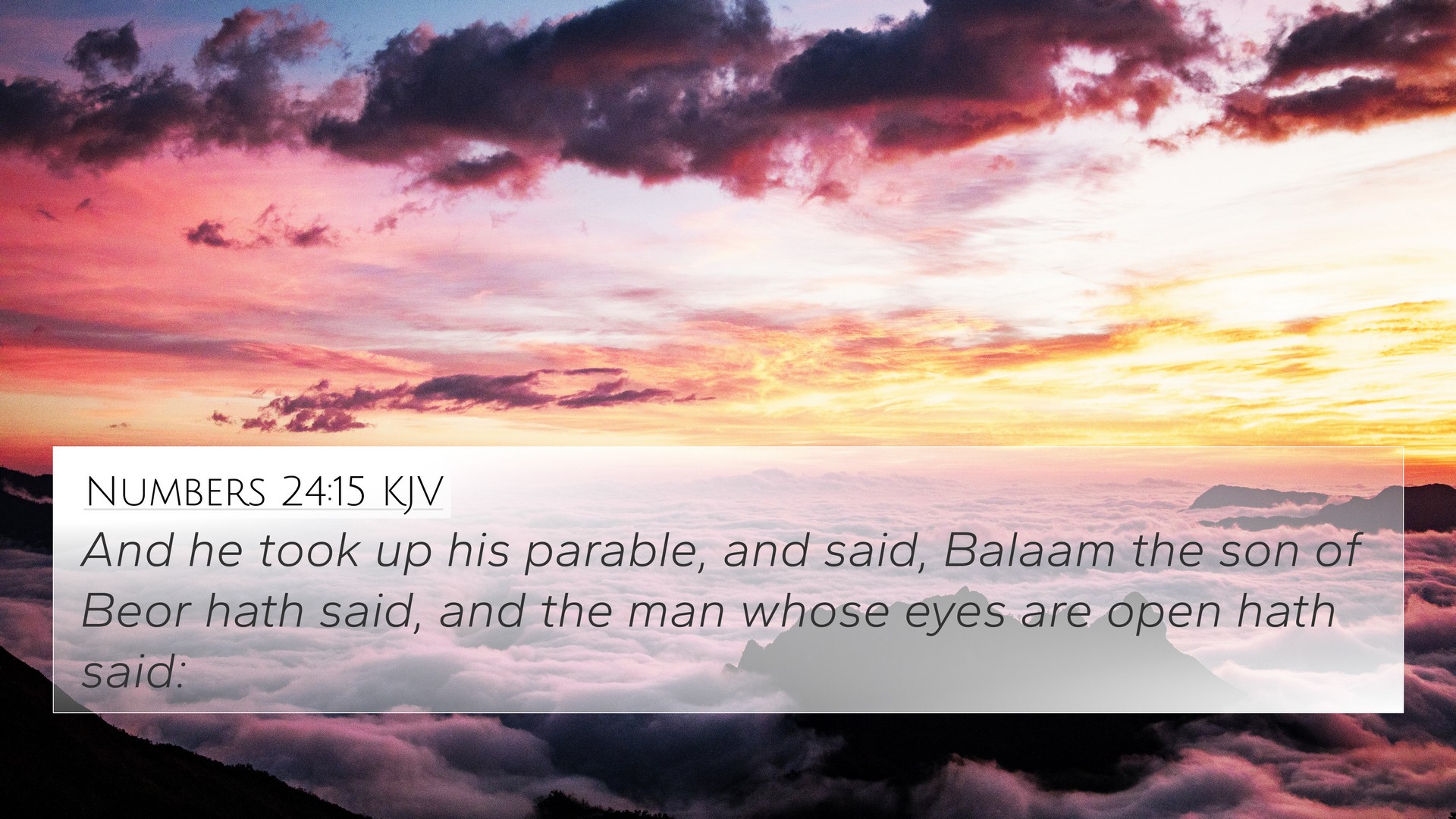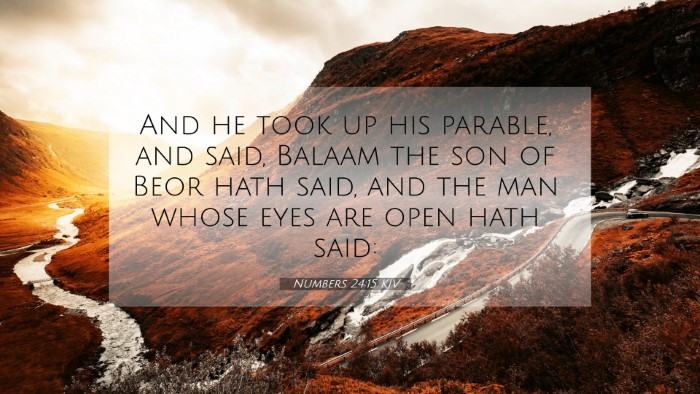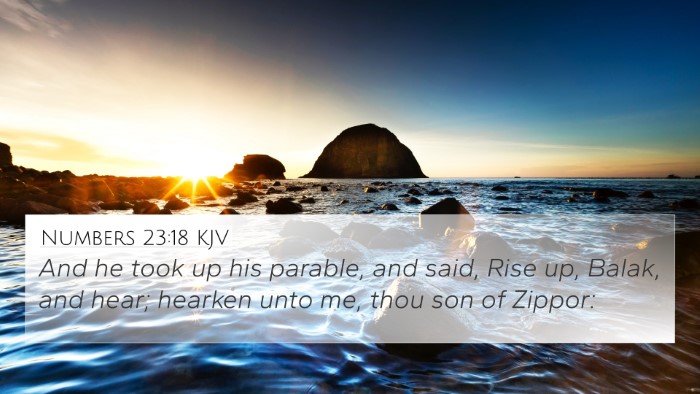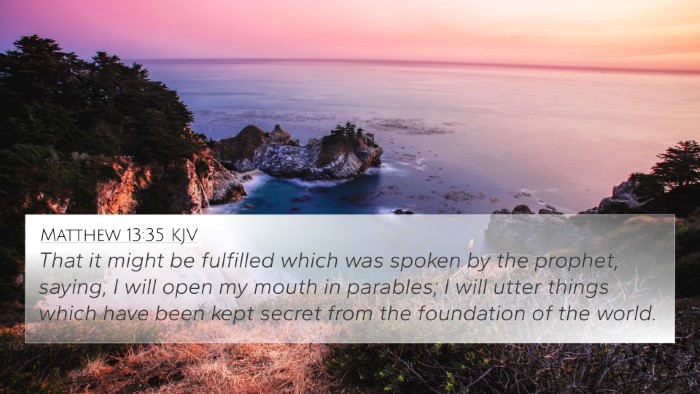Understanding Numbers 24:15
Verse: "And he took up his parable and said, Balaam the son of Beor hath said, and the man whose eyes are open hath said:" (Numbers 24:15)
General Interpretation: This verse marks a significant moment in Balaam's prophecy, highlighting both his identity and the divine revelation he is about to deliver. The context reveals Balaam, a non-Israelite prophet, as a key figure chosen by God to proclaim what is to come concerning Israel.
Significance of the Speaker
Balaam is described as a man whose "eyes are open," indicating his ability to see beyond the ordinary and tap into divine insight. This statement underscores the theme of divine revelation that permeates the Scriptures.
Commentary Insights
-
Matthew Henry:
Henry emphasizes that Balaam's insights stem from God’s revelation, showcasing the importance of divine guidance in prophecy. He notes that even those outside of Israel, like Balaam, can be instruments of God’s purpose.
-
Albert Barnes:
Barnes explains that the phrase "the man whose eyes are open" suggests Balaam's acute awareness of God's workings and the unfolding plans for Israel. He asserts the uniqueness of Balaam's role as a link between God’s message and the people.
-
Adam Clarke:
Clarke notes the significance of Balaam's name and lineage, indicating his potential to lead others by faith, despite his mixed motivations. This serves as a warning of the complexities in understanding God’s intentions through various vessels.
Bible Verse Cross-References
This verse has numerous connections with other scriptures that provide deeper understanding:
- 2 Peter 2:15-16: Discusses Balaam's greed and the consequences of straying from God's command.
- Revelation 2:14: References Balaam’s teaching, warning against stumbling blocks for believers.
- Micah 6:5: Encourages remembrance of the journey and God’s dealings with Israel.
- Deuteronomy 23:4: Speaks on the historical actions of Balaam in relation to Israel.
- Hebrews 11:32-33: Mentions the prophets, highlighting acts of faith involving divine revelation.
- Numbers 22:31-32: Where the Lord opens Balaam’s eyes to see the angel in the way.
- Matthew 2:1-12: The concept of following stars as signs of divine guidance connects back to the idea of revelation.
Connecting Themes in the Bible
This verse also emphasizes various themes throughout the Bible:
- Divine Guidance: Throughout both the Old and New Testaments, individuals are guided by God’s wisdom, as seen in Proverbs 3:5-6.
- The Nature of Prophecy: Both Balaam’s and other prophets’ roles illustrate the prophetic tradition, echoed in texts like Jeremiah 1:4-10.
- God’s Sovereignty: Balaam's story reflects God's control over the nations and prophecies, seen in Isaiah 46:9-10.
- Consequences of Choices: The narrative warns of the pitfalls of aligning oneself against God’s people, as examined in Psalm 105:14-15.
- Covenantal Relationships: The connection between God's covenant with Israel and His warning against their adversaries is explored in Romans 9:4-5.
Tools for Bible Cross-Referencing
To dive deeper into the connections made in Numbers 24:15, consider various tools:
- Bible Concordance: Use a concordance for locating verses and themes linked to Balaam and prophecy.
- Bible Cross-Reference Guide: A guide can help in identifying related verses efficiently.
- Bible Study Software: Several programs allow you to search for connections and cross-references across different translations.
- Commentaries: Utilize commentaries for in-depth exploration of specific themes and relationships in scripture.
- Online Bible Dictionaries: A helpful tool for understanding the context of names and themes.
Reflective Questions on the Verse
- What does it mean for one’s eyes to be opened in the context of spiritual insight?
- How do Balaam's actions reflect on the nature of obedience towards God?
- What lessons can we learn regarding the use of prophetic voices in contemporary settings?
Conclusion
The examination of Numbers 24:15 through various commentaries reveals profound insights into the nature of divine revelation and the role of a prophet. Cross-referencing biblical texts deepens our understanding of the complexities presented in this verse, offering a richer comprehension of scripture as a whole. By exploring interpretations, connections, and the broader context, one can appreciate the intricate tapestry of God’s word and its enduring relevance.







